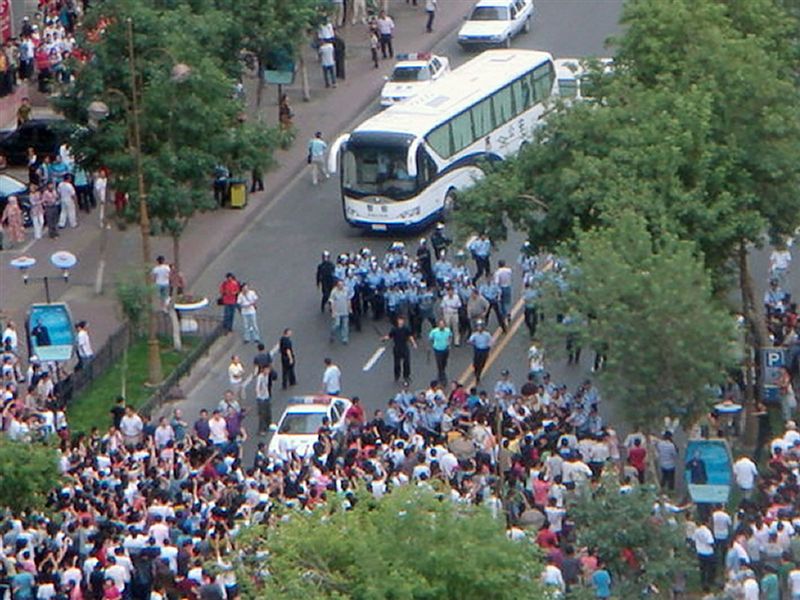
Jihadis Identify U.S. Plots against China in Xinjiang and Africa
Publication: Terrorism Monitor Volume: 7 Issue: 21
By:

In light of the ethnic violence in China’s Xinjiang province, various jihadi internet forums focused on the handling of the turmoil by China’s security forces. A vast region comprising nearly a sixth of China’s total land mass, Xinjiang is home to a number of Central Asian ethnic groups, the largest of which is the Turkic-speaking Uyghur people, until recently the dominant group in the region. Massive government-encouraged post-war migration by Han Chinese has made the Uyghurs a minority in their traditional home, known to Muslims as East Turkistan.
The first response of Salafi-Jihadi forums to any perceived injustice inflicted on Muslims anywhere typically involves citing a conspiracy theory regarding the manipulation of Muslims by the United States. One forum debated China’s “brutal” handling of East Turkistan Muslims in a post entitled; “China, the United States.and al-Qaeda Organization” (muslm.net, July 7, 2009).
On the trouble in the oil-rich Xinjiang region, a jihadi forum member, nicknamed Ibn Khaldoon al-Jaza’iri, accused the United States of interfering in Chinese affairs by instigating the Uyghur Muslims in East Turkistan to rebel against the government. The prospect of China taking a leading role in the world as the next superpower is disturbing to the United States. Therefore, wherever there are Chinese investments, especially in oil and gas, there are troubles caused by the United States, alleges al-Jaza’iri. The United States tries to impede China’s quest for alternative sources of energy badly needed for its rapidly growing economy. For example, China has made big strides in Africa by building strong relations with oil-rich nations based on mutual interests. According to al-Jaza’iri, China exchanges its know-how in infrastructure projects in return for oil from African countries such as Nigeria and Algeria, but the United States uses the Islamic jihadi factions to hinder Chinese efforts to establish a presence in Africa. As an example, al-Jaza’iri gives the terrorist operation in Algeria’s Borj Bouaririj district, where al-Qaeda in the Islamic Maghreb (AQIM) claimed responsibility for killing 18 Algerian gendarmerie escorting Chinese workers building the highway between Algerian capital and Borj Bouaririj. In this case, al-Jaza’iri does not appear to have done his homework – the AQIM attack was carried out when the gendarmerie was returning to barracks after having escorted the Chinese workers to their site. The attack was clearly directed at government security forces and not the Chinese workers (Echerouk [Algiers], June 18; Middle East Online, June 21).
Al-Jaza’iri says the constant harassment of Chinese workers by jihadi factions manipulated by the United States raises Chinese investment costs, but adds that jihadis should be careful not to fall for U.S. exploitation and should refrain from attacking Chinese technicians and workers building roads, communication networks and oil facilities for the benefit of Muslims in Islamic countries. It’s likely that the United States will attempt to set fire to Eastern Turkistan by directly or indirectly supporting jihadi operations there, similar to what they did in Afghanistan, backed by religious fatwas (religious rulings) from Saudi Arabia’s Salafist shaykhs. The “stupid Chinese communist regime,” blinded by its hatred for Islam, is expected to fall for the U.S. plan and commit massacres in Eastern Turkistan. Finally, al-Jaza’iri concludes his posting by calling on al-Qaeda leaders to be smart enough not to plunge into the U.S. trap to weaken China.
The majority of forum members disagreed with al-Jaza’iri. “Abu Hamza al-Alawi” rejected the notion that the mujahideen could be manipulated by the United States, adding the mujahideen follow their own agenda regardless of who benefits from their terrorist actions, so long as jihadi objectives are met. The era of U.S. weapons supplies for Muslims to fight communists is over, says al-Alawi, adding that the Western experience with jihadi factions has taught them that Muslims can’t be manipulated.
In response to al-Alawi’s rebuke, al-Jaza’iri insists the Mujahideen are supported by the West in cases that serve their interests. He contends the West doesn’t categorize the Chechen Mujahideen as a terrorist group because they serve the Western objective of weakening the Russian Federation. [1] The Chechen mujahedeen are considered a legitimate resistance group by the West, which supplies them with weapons through pro-Western Georgia. Al-Jaza’iri claims the West doesn’t perceive the Chechen fighters to be powerful enough to declare an Islamic state that would pose a threat to the West.
Other jihadi forums also focused on the turmoil in Xinjiang. “Abu Hassim al-Ghareeb” urged Muslims not to forget the Turkistan Muslims suppressed by China and to help prevent the Chinese from liquidating their Islamic identity (hanein.info, July 8). Regarding ways of supporting Turkistan, some forum members suggested boycotting Chinese products and investments in Muslim countries, but other, more extreme members called for jihad against China to return the favor of the Turkistan jihadis who they claim poured into Afghanistan in the 1990s, pledged alliance to the Afghan Islamic Emirate, trained in al-Qaeda camps and fought alongside the mujahideen. In the words of one forum member who urges jihad in China; “Neither boycott nor protests will stop the slaying of our brothers. The solution, known to everyone, is jihad. Who will sell himself to God and rush to the battlefield?” A third forum member called upon global jihad leaders Osama Bin Laden and Ayman al-Zawahiri to pay more attention to the revolution in Turkistan and to extend financial and moral support to the Turkistan Mujahideen to make sure they remain adherents of the Salafi creed and part of the global jihadi movement. “Take the initiative. Choose from among them whom you think suitable to lead an Islamic Emirate” said a posting from an Iraqi jihadi forum (faloja1.info, July 8). Again, the jihadi forum members betray their lack of knowledge about East Turkistan – Salafists are extremely rare in the region, where Sufism remains the dominant creed of Xinjiang’s Sunni Muslims.
Members of more moderate forums expressed concern over conducting terrorist attacks in China. Any terrorist attacks there would give the Chinese government a legitimate reason to crush Turkistan’s Muslims, says “First Lieutenant Ata” – “Muslims should only boycott Chinese products and organize protests in front of Chinese embassies. Any direct external military Muslim interference in Turkistan would only exacerbate the problem” (4flying.com, July 10).
The jihadi forum members’ hypothesis of U.S. manipulation of jihadi factions to prevent China from becoming a superpower seems far fetched. China is not powerful enough to threaten Western powers militarily or confront the United States. At best, China could stir up problems for the purpose of making economic gains from the Western world in a way similar to Russia. It is also unrealistic to assume that al-Qaeda and other jihadi factions would play a significant role in a Chinese-Western struggle over Africa or elsewhere. Al-Qaeda terrorist activities in Algeria, for example, are due to an internal Algerian struggle and not to U.S. manipulation of jihadi factions against China’s newly established interests in the region.
Notes:
1. Presumably al-Jaza’iri means the Chechen mujahideen are not categorized as a terrorist group “in practice.” Several Chechen mujahideen organizations and individuals have appeared on Western and UN designated terrorist lists.





